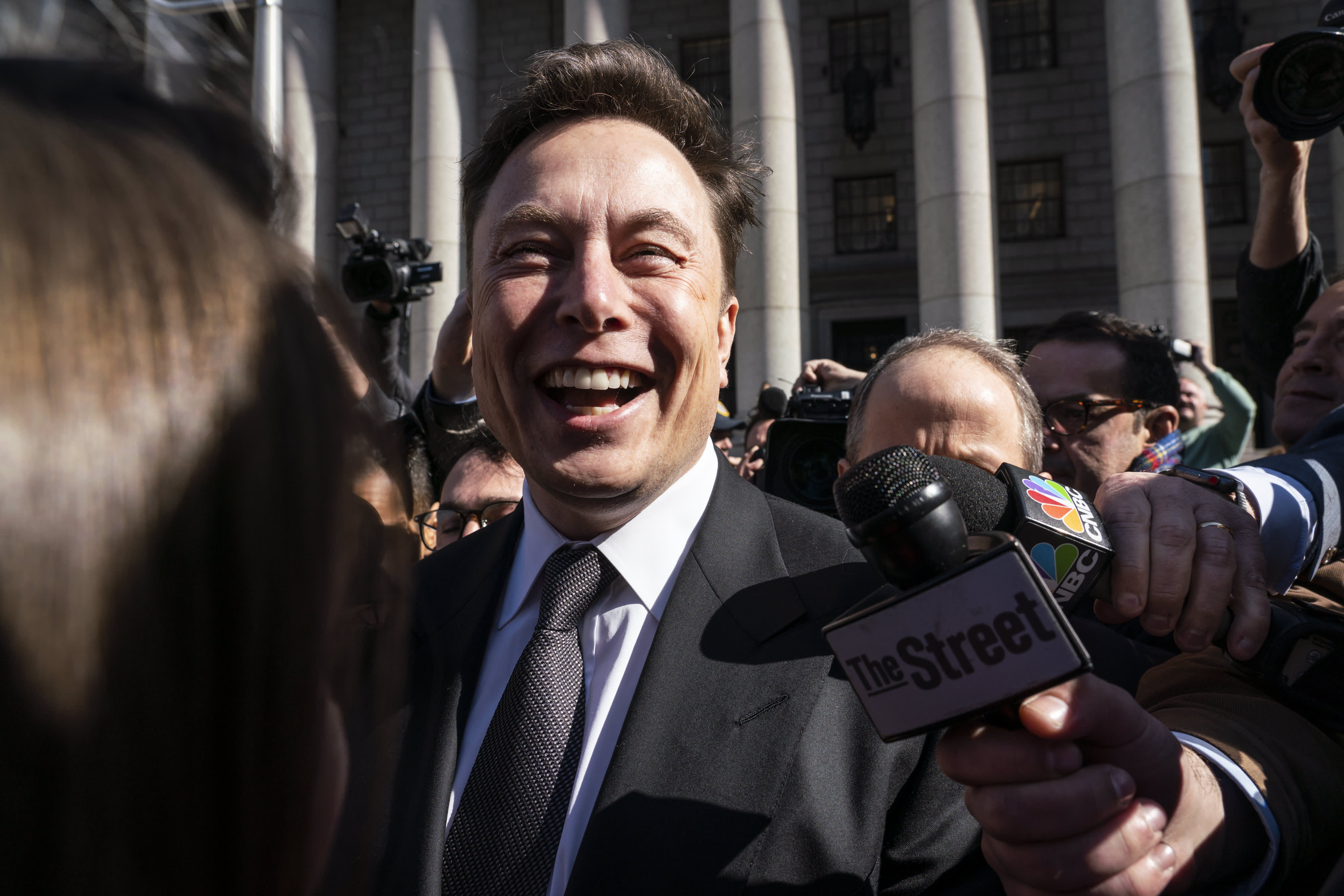Elon Musk to investors: Self-driving will make Tesla a $500 billion company

Elon Musk, chief executive officer of Tesla Inc., smiles while speaking to members of the media outside federal court in New York, U.S., on Thursday, April 4, 2019.
Natan Dvir | Bloomberg | Getty Images
Citigroup and Goldman Sachs, who are underwriting Tesla's latest effort to raise $2 billion in new funds, held a "broad investor call" on Thursday, where CEO Elon Musk and CFO Zach Kirkhorn answered brokers' questions about their plans for the electric vehicle maker.
According to two invitees who attended the call, CEO Elon Musk talked up Tesla's self-driving strategy right off the bat, expanding what he and other execs said at a recent event for investors that the company dubbed "Autonomy Day. "
Musk confidently told investors on the call that autonomous driving will transform Tesla into a company with a $500 billion market cap, these people said. Its current market cap stands around $42 billion. He also said that existing Teslas will increase in value as self-driving capabilities are added via software, and will be worth up to $250,000 within three years.
The call came as the company is looking to raise $650 million in equity and $1.35 billion in convertible bonds. Filings indicate that Tesla plans to use the capital for general corporate purposes. On the call, Musk said Tesla would be able to fund its business needs through cash flow, but that it was wise to have a buffer in case of a recession or weak global auto demand.
Kirkhorn reminded investors on the call that nothing has changed in Tesla's outlook for Q2. The company still expects to deliver 90,000 to 100,000 vehicles in the second quarter, and 360,000 to 400,000 vehicles total this year.
On an unadjusted basis, Tesla lost $702.1 million, or $4.10 a share, during the first quarter of 2019. The company's shares rose more than 4% on Thursday following the announcement of the new funding solicitation, but remain down more than 25% year to date.
It's all about driverless now
According to the two investors who heard the call, Musk described Tesla's existing electric vehicle, solar, and energy storage business lines as a backstop of value to Tesla's business in a new driverless era.
He said that even though Tesla drivers need to keep hands on the wheel today, that will become less necessary over time. Musk said that competitors such as GM's Cruise and Alphabet's Waymo can't catch up because Tesla has a fleet of connected cars on the road today, and a proprietary chip.
The hundreds of thousands of Teslas already on the road constantly slurp up data and send it back to Tesla's servers, which helps the company improve and advance its Autopilot and Full Self-Driving systems. Meanwhile, the company's self-driving computers, which it started working on about three years ago, are exclusive to Tesla and allegedly use less power in the vehicle than offerings from competitors like Nvidia.
Musk reiterated that because Teslas can be upgraded "over-the-air" with new software-enabled features and functionality, they will appreciate in value, unlike nearly every other car on the market. A Tesla will be worth $150,000 to $250,000 in 3 years, he claimed. He also said that a full self-driving upgrade will increase the value of any Tesla by a half order of magnitude, or five times.
Tesla expects to have 1 million vehicles on the road next year that are able to function as "robo-taxis," Musk said, reiterating statements made at Autonomy Day and on the company's Q1 earnings call. Each car should be able to do 100 hours of work a week for its owner, making money as a robo-taxi he told investors.
Some investors and analysts have expressed skepticism about the robo-taxi plan and Tesla's self-driving strategy in general.
For instance, in a note to investors after Autonomy Day, Cowen analyst Jeffrey Osborne wrote: "We see a significant amount of technology and execution risk in the shift in strategy from competing in just electrification to Tesla also beating Nvidia in hardware, Google in software, and building a better ride-hailing service than current ride hailing leaders. "
He added in the note, "The Tesla Network robotaxi plans seemed half baked, with the company appearing to either not have answers to or not even considered pretty basic question on the pricing, insurance liability, or regulatory and legal requirements."
Zachary Kirkhorn, CFO, Tesla
Source: Tesla
On Thursday's investor call, according to the people who heard it, Musk and other Tesla execs declined to give details when it came to more pragmatic issues like where the company's order book stands today, what they are doing to ameliorate problems with Tesla service and repairs, how much income Tesla expects to generate from regulatory credits for the rest of this year, and who will supply battery cells to Tesla in Asia as it begins manufacturing Model 3s in Shanghai.
One person asked what Tesla could do to improve its gross margins from the approximately 20% reported in the first quarter of 2019. The company previously promised it could achieve 25% margins.
Musk told investors Tesla would try to improve efficiency in its supply chain, but would feel good about 20% gross margins moving forward.
But he also tried to drive the conversation back to autonomy, calling it the fundamental driver of value for Tesla, and urged investors to stop nit-picking over vehicle margins.
Read More
No comments